Existing User Log In
New User Registration
Register for a free account to gain full access to the VGChartz Network and join our thriving community.



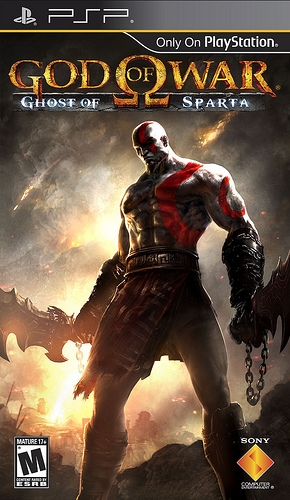

America - Front
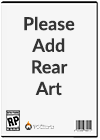

America - Back

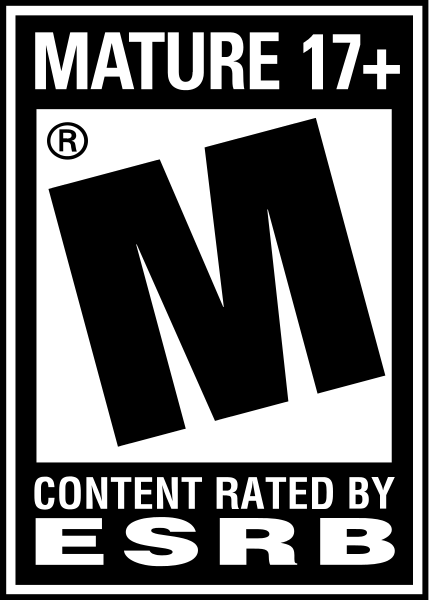
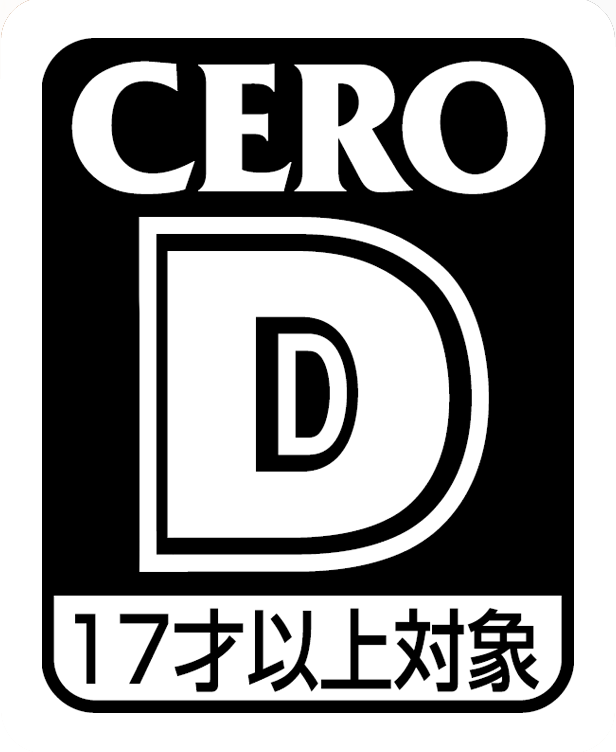
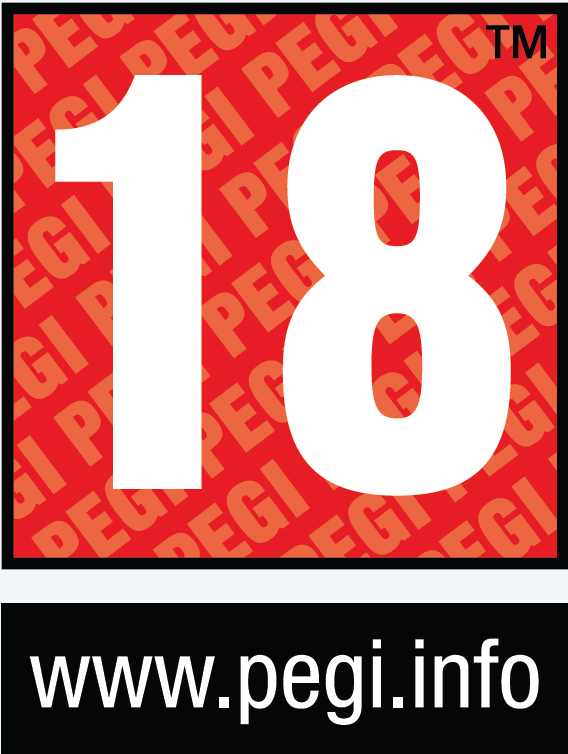
God of War: Koutan no Kokuin
ゴッド・オブ・ウォー 降誕の刻印
Ready at Dawn
Action
 11/02/10 Sony Computer Entertainment
11/02/10 Sony Computer Entertainment  11/11/10 Sony Computer Entertainment
11/11/10 Sony Computer Entertainment  11/05/10 Sony Computer Entertainment
11/05/10 Sony Computer Entertainment
| Owners: | 134 | |
| Favorite: | 16 | |
| Tracked: | 7 | |
| Wishlist: | 19 | |
| Now Playing: | 1 | |
God of War III released back in March of this year to wide acclaim, hailed for its fantastic visuals, gameplay, and an overall great ending to the trilogy. Ghost of Sparta, the series' second entry on the PSP, comes as a surprise so soon after what was thought to be Kratos’ swan song. Developer Ready at Dawn has done well to improve upon their previous effort, God of War: Chains of Olympus, in almost every way. This game is a meaningful entry into the heralded action series and fleshes out the time between the first GoW games without messing with the cannon.
Most people would probably take a break and enjoy their ascension to the throne as God of War, especially after the bloody ordeals it took to get there. Not Kratos. Still haunted by visions of his past, Kratos goes in search of answers in the Temple of Poseidon in the heart of the city of Atlantis. By now, series veterans should know that these games always start strong and Ghost of Sparta is no different. Similar to the first title, the game starts aboard a ship in the middle of storm-battered waters. Several nefarious enemies assail the newly crowned God of War before he engages in a sprawling boss battle that comes to a climax a considerable amount of time later.
Combat is as bloody, satisfying, and consistent as you would hope. Nothing new has been added to the core combat and only a few elements made their way over from God of War III. Ghost of Sparta plays like a refined Chains of Olympus. The same combat scheme of light and heavy attacks and grapples never seems to get old. The brutality manages to retain its shock value even after so many outings.
What truly sets Ghost of Sparta apart from the other games in the series are the new weapons and magic attacks. Early on, Kratos learns the ability to activate Thera’s Bane, adding fire to his Blades of Athena. Thera’s Bane is similar to Rage of the Gods found in GoW III. It comes with its own red meter that steadily replenishes. This ability does more than provide stronger attacks; certain enemies can only be toppled with the added firepower and it is also necessary to open certain doors and clear puzzles.
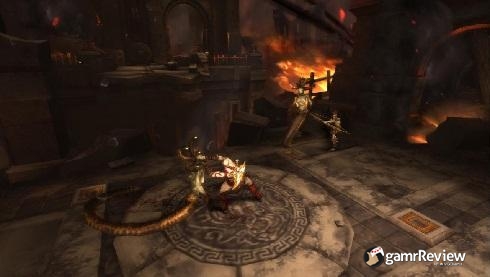
Another new weapon is the Arms of Sparta. This is the classic shield and spear combo so often featured in depictions of ancient Greek warfare that has been conspicuously absent in the series until now. The Arms of Sparta represent one of the more versatile components of Kratos’ arsenal. The spear can be used for both melee and ranged attacks while you can take cover behind the shield and move at the same time. Sadly, it is not a very interesting weapon for combat because it has fewer combos and does not work as well for swarms of enemies as the Blades of Athena. In addition, there are no unique finishing animations for the Arms of Sparta; Kratos automatically reverts to his blades during QTEs.
Kratos also learns two new magic attacks: the Eye of Atlantis and Scourge of Erinys. Eye of Atlantis is a lighting based attack, similar to the lightning based moves featured in other God of War titles. Scourge of Erinys produces a swirling orb of energy that sucks in nearby enemies, delivering a steady amount of damage.
The controls are largely the same as the last GoW outing on the PSP, meaning they are comfortable enough to get the job done. One new addition is the Hyperion Charge, executed by holding the L and circle button in conjunction. This allows Kratos to tackle regular sized foes to ground and then lay the proverbial smackdown. There are also a few aesthetic improvements to the context sensitive attacks that make for a more efficient system. The button prompts now appear on the sides of the screen relative to the PSP button layout and you are not asked to manipulate with the analog nub as often as before.
One of the major complaints leveled against Chains of Olympus was its lack of difficulty. Ghost of Sparta fairs better in this regard. The combos are not quite as overpowered and the enemies put up more of a challenge this time around. On the normal difficulty you can expect to die every so often, especially when facing multiple respawning Cyclopes or other large mythical monsters at once. The enemies you encounter are all unique to this game, at least in appearance. Some employ attacks reminiscent of those in past games, but every now and then you will come across one that catches you by surprise. The small number of puzzles don't provide much of a challenge and merely serve to break up the action.
The fixed camerawork is really well done. You always have a functional and visually pleasing view of the action on-screen. I never had any problems with large enemies obscuring my vision of Kratos or cheaply forcing me into a corner. The camera is particularly effective at presenting some of the more cinematic events of the adventure. Kratos finds himself sliding, grappling, and jumping away from numerous collapsing structures at high speeds, all of which are a thrill to witness and play through.
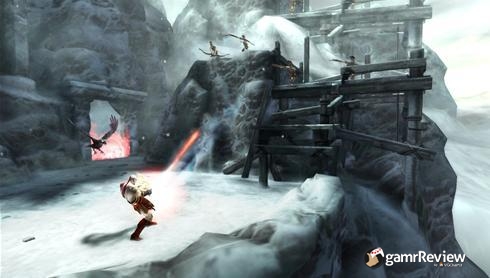
Upon completing the original God of War, a video is unlocked detailing how Kratos came to be separated from his younger brother, Deimos. Nothing came of this story tidbit in the following two games in the console trilogy or in Chains of Olympus. Ghost of Sparta finally picks up the narrative reigns and fleshes out the back-story of Kratos’ family. Not to spoil the story, but the God of War takes the term family feud to a completely new level (we’ve already seen what he did to his father). The story fills in some lingering plot holes and has some touching moments worth experiencing for any fan of the series. This time, collateral damage from Kratos’ fury includes the entire city of Atlantis itself, and we do get to see Kratos return to Sparta and walk around like a big shot. Oh, and it features the best sex mini-game in the series, period.
Graphically, this is one of the most beautiful PSP games out there. Kratos’ character sports more detail than his last portable appearance. The environments are visually appealing to traverse and the blood rendering is more convincing than it was in Chains of Olympus. Unfortunately, the cut scenes are a tad muddy, inconsistent with the series’ usual standards. Load times are practically non-existent but you may find some unseemly pauses and slowdown during combat, though not often enough to hamper your enjoyment of the game. Just when the constant brown and grey look of the levels was starting to get noticeable, the game throws some luscious aquatic blue water and fiery red environments at you. Overall the color palette could do with more infusion of color but it is a beautiful game nonetheless. The music, voice acting, and overall sound design are strong as well.
God of War: Ghost of Sparta is not woefully short, like Chains of Olympus is, but it is still a quick playthrough. Somewhere around five to eight hours is how long I expect most gamers will take to complete the game. Completing the game unlocks God Mode, which is significantly more difficult, but there is not much incentive to play through it other than to acquire more orbs and purchase goodies from the Temple of Zeus. Other bonuses include the Challenge of the Gods and the Combat Arena, both of which are nice, if insubstantial distractions that will keep you playing a bit longer.
If you felt a sudden sense of emptiness upon completing God of War III, worrying that it would be the last adventure in the series, then Ghost of Sparta is just what the doctor ordered to ease the pain. Essentially, this game is another dosage of God of War goodness to satisfy fans. When all is said and done, the portable God of War games are not as satisfying to play as their console counterparts, but if you were disappointed by Chains of Olympus then you shouldn't be too hesitant to pick this sequel up; simply put, it's better in every way.










|
|
|
|
|
JustThatGamer
posted 13/12/2015, 12:17
At last it hits 1 million sold at retail! Fucking amazing game. Message | Report |
|
|
|
|
|
|
|
|
|
|
|
-girgosz-
posted 06/06/2012, 09:05
http://playstationlifestyle.net/2012/06/05/god-of-war-franchise-sells-21-million-units/ Here are the official sales. The game sold 1.2 million. Good to know :P Message | Report |